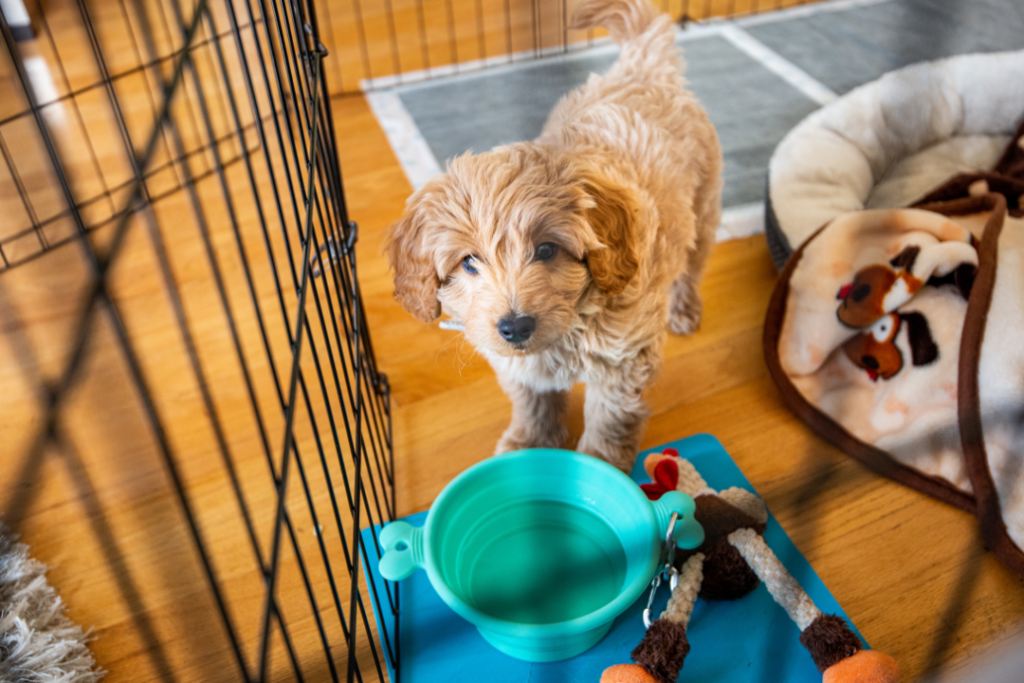Puppy Potty Training Regression
Hey fellow puppy parents! We’ve all faced that bewildering moment where our fur-baby, once championing the art of potty etiquette, suddenly does an about-face. This daunting scenario is commonly termed as ‘puppy potty training regression’. But before you sigh in despair, let’s unravel the mystery. Our goal? To empower you with the knowledge and tools to reclaim that potty prowess!

Understanding the Problem
What is Puppy Potty Training Regression?
In the world of puppy parenting, regression is like your little furball hitting the reverse gear. Imagine teaching a child to write, and then suddenly, they forget how to hold a pencil. That’s how drastic it can be with pups. Potty training regression is not just a temporary slip or a one-off accident. It’s a more consistent backslide into old, untrained behaviors. Think of it as them momentarily “forgetting” the rules of the house.
Differentiating From Initial Challenges
It’s important to discern regression from initial training challenges. When you first bring a puppy home, they’re like a blank slate, trying to understand your world. Initial potty training is all about teaching them the basics – where to go, understanding signals, and building a routine. Regression, on the other hand, occurs when a once-trained pup starts deviating from the learned routine. It’s as if they’ve misplaced a piece of their training puzzle.
Common Signs of Regression
So, how do you spot regression? It’s not just about the occasional accident:
- Frequency: If your pup was accident-free for weeks and now suddenly has daily slip-ups, it’s a red flag.
- Hiding the Act: A regressing puppy might sneak away to do their business, indicating they remember the rules but are choosing to break them.
- Change in Behavior: Along with potty mishaps, they may appear more anxious, especially around potty time, or display avoidance tactics when it’s time to go out.
- Resistance to Familiar Commands: If your previously trained pup suddenly turns a deaf ear to commands like “Go Potty,” you might be in regression territory.
Emotional Response
Potty training regression can be emotionally challenging, not just for the puppy but for the owners too. There might be moments of frustration, confusion, or even guilt. “Where did I go wrong?” is a common sentiment. But understanding that regression is a natural, albeit challenging, part of a pup’s developmental journey can provide some solace.
Causes of Regression
Medical Issues
One of the foremost reasons for a sudden change in potty behavior can be rooted in medical concerns:
- Urinary Tract Infections (UTIs): Common in puppies, UTIs can make it painful or difficult for them to hold their bladder. Frequent urination, blood in the urine, or discomfort are typical signs.
- Gastrointestinal Upsets: If your pup has diarrhea or is going more frequently, it could be due to something they ate or an underlying GI problem.
- Parasites: Worms or other parasites can disrupt a puppy’s bowel movements, leading to unexpected accidents.
- Medications & Vaccinations: Sometimes, side effects from recent vaccinations or medications can temporarily affect their potty habits.
Behavioral Factors
Beyond the physical, there are numerous emotional and behavioral triggers:
- Anxiety and Fear: Traumatic incidents, like a negative experience with a louder dog or being reprimanded too harshly, can create a fearful association with going potty outdoors or in specific areas.
- Attention-seeking Behavior: Puppies might quickly learn that an “accident” gets immediate attention, even if it’s negative.
- Changes in the Household: New family members, a new pet, or even the absence of a familiar face can stress your puppy.
- Inconsistency in Training: If different family members are sending mixed signals or not following a consistent routine, it can confuse the puppy and lead to regression.
Developmental Changes
Our pups grow, and with growth come various phases:
- “Teenage” Phase: Like human teenagers, adolescent dogs (typically between 6-18 months) often push boundaries and test their independence. This rebellious phase might see a lapse in previously learned behaviors.
- Distraction: As pups grow, their world expands. A falling leaf or a flying insect can easily divert a young dog’s attention from its potty routine.
- Maturity & Hormonal Changes: As puppies reach sexual maturity, they may mark territories more often. This behavior, especially common in unneutered males, can sometimes be mistaken for regression.
Addressing the Problem
Medical Evaluation
When suspecting medical concerns, it’s paramount to consult a professional:
- Prompt Veterinary Check: Delaying a visit might not only prolong the regression but can also risk exacerbating any underlying health issues.
- Regular Monitoring: After your initial vet visit, keep an eye out for any changes in your pup’s behavior, appearance, or habits. It helps in early detection if the problem persists or if new issues arise.
Re-establishing Routine
Consistency is the backbone of effective training:
- Scheduled Potty Breaks: Like clockwork, ensure your pup gets out at the same times daily, especially after meals, play, and waking up.
- Observation is Key: Just as you did during initial potty training, closely monitor your puppy for signs that they need to go, such as sniffing, circling, or showing restlessness.
- Avoid Overwhelming Changes: While routine is crucial, be wary of introducing too many changes at once. Slowly phase in any alterations to avoid overwhelming your pup.
Positive Reinforcement
Remember, motivation plays a massive role in learning:
- Timely Rewards: Rewarding your puppy immediately after they “do their business” in the right place will reinforce the behavior. Whether it’s a treat, praise, or play, make sure it’s instant.
- Avoid Negative Reinforcement: Scolding or showing disappointment can often backfire, causing more anxiety or even fear in your puppy. Remember, encouragement yields better results.
Environmental Adjustments
Sometimes, it’s the surroundings:
- Ideal Potty Spots: Ensure the designated potty area is clean, quiet, and free from distractions. For indoor pups, make sure potty pads or litter boxes are in easily accessible locations.
- Odor Elimination: Dogs often revisit spots they’ve marked before. Use an enzyme cleaner to completely eliminate any accident odors, deterring them from using the same spot again.
- Create a Safe Space: If external noises or activities are causing anxiety, consider creating a more sheltered or protected space for them to relieve themselves.
Involving the Pack
Remember, you’re not in this alone:
- Family Involvement: Make sure all household members are on the same page with routines, commands, and rewards. This unified approach avoids sending mixed signals to the pup.
- Group Training: Sometimes, attending group training sessions or puppy classes can be beneficial, not just for the training but also for socialization.
Additional Tips and Tricks
- Keep a Diary: Tracking their potty times can reveal patterns and help you anticipate their needs.
- Stay Calm: Puppies pick up on our emotions. If you’re anxious, they will be too.
- Seek Professional Help: If you’re stuck, consider hiring a dog trainer or attending a puppy class.
Common Mistakes to Avoid
- Delayed Corrections: Addressing an accident hours after it happened is ineffective. Puppies live in the present. They won’t connect a later reprimand with something they did hours ago. Instead, focus on preventing future mistakes and reinforcing good behavior.
- Using Ammonia-based Cleaners: These can leave a scent reminiscent of urine, inadvertently encouraging your puppy to go in the same spot again. Opt for enzyme-based cleaners which break down and neutralize odors.
- Being Overly Harsh: Negative reactions like shouting, rubbing their nose in their mess, or physical punishment can instill fear and anxiety. This not only damages your bond but can also make potty training even more challenging.
- Setting Unrealistic Expectations: Every puppy is different. While some may grasp potty training quickly, others might take more time. Patience is essential. Remember, they’re not having accidents to spite you; they’re learning.
- Lack of Supervision: Especially during training or retraining phases, it’s crucial to keep an eye on your pup. Without proper observation, you might miss the signs that they need to go, leading to more accidents.
- Skipping Routine Vet Checkups: Regular veterinary examinations aren’t just about vaccinations. They’re opportunities to catch potential medical issues early on, which might be contributing to potty training challenges.
- Overfeeding or Irregular Feeding Times: A consistent feeding schedule is essential. Overfeeding or feeding at random times can make it hard to predict when your pup needs to go, making accidents more likely.
- Neglecting Socialization: A well-socialized puppy is generally more confident and less anxious in various situations. Ignoring this aspect can lead to a nervous pup who might have more accidents.
- Inconsistent Commands: Using different words or phrases for the same action can confuse your puppy. Ensure everyone in the household uses consistent commands like “Go potty” or “Outside.”
- Not Rewarding Enough: Positive reinforcement is a potent tool. Forgetting to reward your pup when they do right can make them less motivated to follow the desired behavior.
Frequently Asked Question
It’s usually a mix of health, behavior, or developmental challenges.
Signs like unusual behavior, changes in the frequency or consistency of elimination, or discomfort can hint at medical concerns.
No age is immune! However, it’s more common after initial training has settled in.
Indeed! Dogs thrive on routine, and disruptions can lead to confusion.
Conclusion
Navigating puppy potty training regression might feel like decoding a complex puzzle, but with patience, persistence, and a dash of puppy love, success is just around the corner. Take heart in the journey and know that every challenge faced together only strengthens the bond you share with your furry friend.
